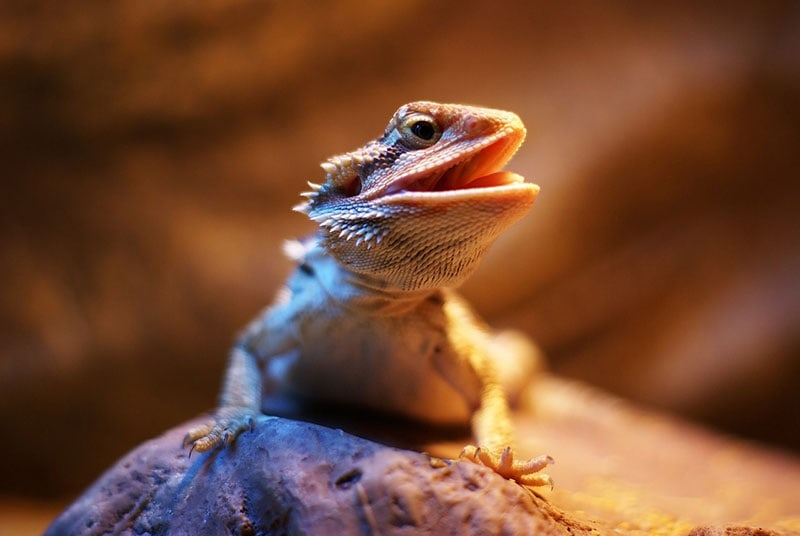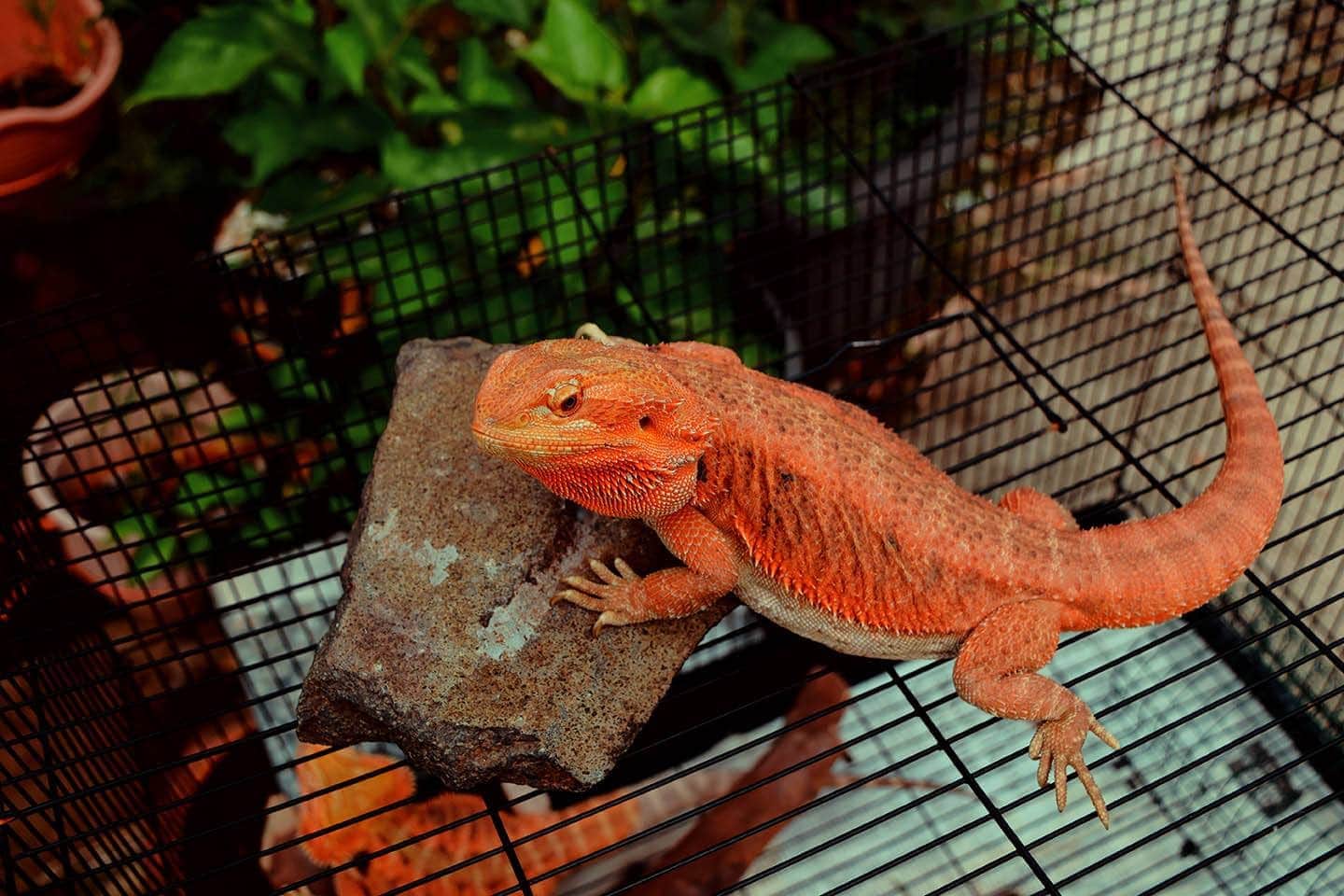Can Bearded Dragons Eat Cucumbers? Vet-Approved Benefits & Dangers
Updated on
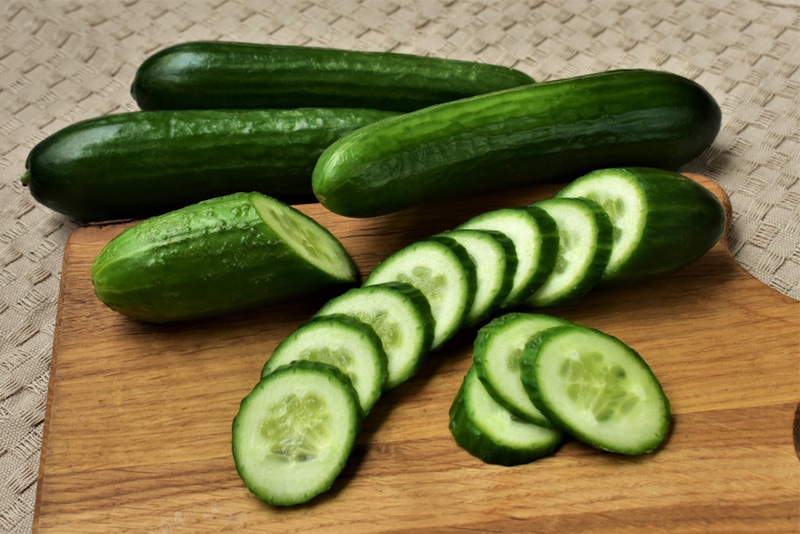
When people talk about having pets in the home, cats and dogs are the instant thought. Not everyone is into cats and dogs or allowed these pets in their homes. For those people, finding unique pets is a must. Bearded dragons, also known as “beardies” are one of these pets. Beardie parents will share pics on Instagram and make TikToks with their reptiles just like other pet parents. They love their reptile and want to ensure they have the best food and health possible. This can be a bit tricky since beardies require a particular diet. Like with any other pet, this leaves bearded dragon owners asking important questions when it comes to their pet’s health. What should I feed my reptile? Can bearded dragons eat cucumbers? The answer to that question is yes, bearded dragons can eat cucumbers, but only every other week or so.
Let’s learn more about why cucumbers are safe to feed a beardie, how to prepare them, and a safe feeding schedule for these amazing reptiles.
- Beadies Overview
- The Nutrition in a Cucumber
- The Benefits
- The Dangers
- How to Prepare Cucumbers for Your Beardie
- Foods to Avoid
A Bit About Beadies
Bearded dragons are native to Australia with 8 different species on the planet today. These lizards are moderate in size and can range in color from a light tan to a darker brown. They get their names from the thick, beard-like collar around their necks. All in all, beardies are docile and easy to tame. However, they do have specific dietary and environmental needs to keep them healthy. Bearded dragons are omnivores meaning they eat both plant and animal matter. Young beardies need a higher percentage of insects for protein while they are growing. Once adults, they become more herbivorous and vegetable matter makes up at least 50% of their overall diet. The plant materials in a beardie’s diet should be around 80% to 90% leafy green veggies. Fruits should account for only around 10% . The key to a healthy bearded dragon is to ensure you offer a varied diet and that the foods fed to them are nutrient and vitamin-rich. It’s always best to discuss your beardie’s overall diet with your vet.

The Nutrition in a Cucumber
Did you know that most people think of cucumbers as vegetables but they are classified as a fruit? It’s true. Botanically, the cucumber, which grows on a vine, is a fruit. Of course, thanks to the way it’s used in foods, from a culinary standpoint it’s considered a veggie. When looking at the makeup of the cucumber, you’ll find that it’s mostly water. That doesn’t mean they aren’t somewhat nutritious, however. Here’s the nutritional value of 100g of peeled cucumber as per the FDA.
- 7 g of fiber
- 7 g of water
- 14 mg of calcium
- 59 g of protein
- 21 mg of phosphorus
- 136 mg of potassium
- 2 mg of vitamin C
- 2 micrograms of vitamin K
- 38 g of total sugars

The Benefits of Feeding Cucumbers to Your Bearded Dragon
As we’ve already mentioned, cucumbers are a nice treat for your bearded dragon to enjoy now and then but shouldn’t become a staple of their diet.
As well as being a hydration boost due to the high water content, cucumber contains a few other potential nutritional benefits for you beardie when fed every so often:
- Vitamin K helps with blood clotting and bone strength.
- Fiber helps digestion and can help prevent constipation.
- Potassium aids in kidney health and can help keep muscles working properly.
- Vitamin C is good for a beardie’s immune system, growth, and vision.
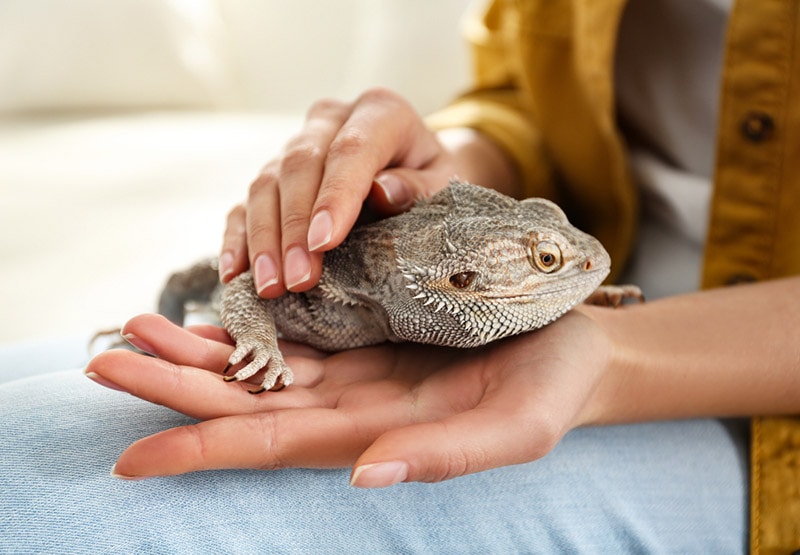
The Dangers of Feeding Cucumbers to Your Bearded Dragon
Cucumbers simply don’t offer enough vitamins and minerals to your bearded dragon to be considered a staple food. This is why it’s suggested that beardies only have these fruits every other week or so as a treat, not a main source of nutrition. However, there are a few dangers associated with feeding cucumbers to your beardie that you should be aware of before you do it. Let’s check those out now.
- If not prepared correctly, cucumbers can cause constipation thanks to the tough skin that is difficult for bearded dragons to digest.
- Cucumber seeds that are too large can cause digestive tract blockages.
- Cucumbers contain a lot of water which can over hydrate a beardie and cause diarrhea. The high water content can also fill your beardie up without offering adequate nutrition.
- Cucumbers have a calcium to phosphorus ratio of around 0.7:1. Bearded dragons have a higher need for dietary calcium than phosphorus. Calcium deficiencies in bearded dragons can lead to metabolic bone disease.
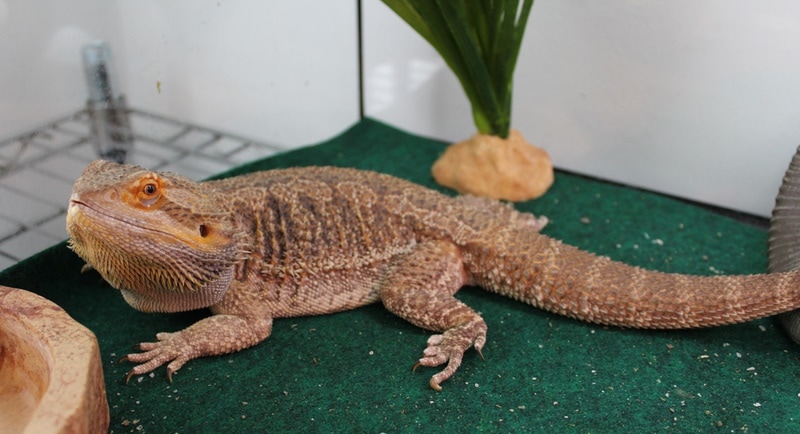
How to Prepare Cucumbers for Your Beardie
Proper preparation of cucumbers is essential before you offer them to your bearded dragon. You should also remember that cucumbers should only be offered once in a while as a treat and not a main staple of your dragon’s diet. Make sure you choose fresh cucumbers that aren’t wilted or potentially going bad. Once you’ve done that, follow these steps to make a tasty treat for your beardie.
- Wash the cucumber thoroughly to remove any dirt, bacteria, and pesticides on the skin.
- Bearded dragons shouldn’t eat cucumber peels so completely remove it.
- Next, slice open the cucumber and remove all seeds to avoid your beardie getting blockages from eating them.
- Cut the cucumber into small pieces your beardie can eat.
- Serve the cucumber by itself or with other foods.

Foods Your Bearded Dragon Should Not Eat
While we’re discussing bearded dragons, every owner should know the foods that are considered poisonous or unsuitable for their reptile to eat. Here’s a list so you’ll know to avoid these foods and keep your bearded dragon healthy.
- Fireflies
- Garlic
- Avocado
- Eggplant
- Rhubarb
Final Thoughts
Bearded dragons are a fun pet for reptile lovers, no matter their degree of experience. If you’re interested in owning a beardie, or already have one and want to make sure they get the best foods possible, the key is to ensure they eat a varied diet of nutritious foods. While cucumbers are a nice treat for your beardie you can’t make them a staple of their diet. Instead, offer your beardie a properly prepared cucumber every other week or so while you keep the rest of their diet on pace for great health.
See Also:
- Can Bearded Dragons Eat Tomatoes? Vet-Approved Facts & FAQ
- Can Bearded Dragons Eat Broccoli? Vet-Approved Benefits & Risks
Featured Image Credit: yubimova Tatiana, Shutterstock


